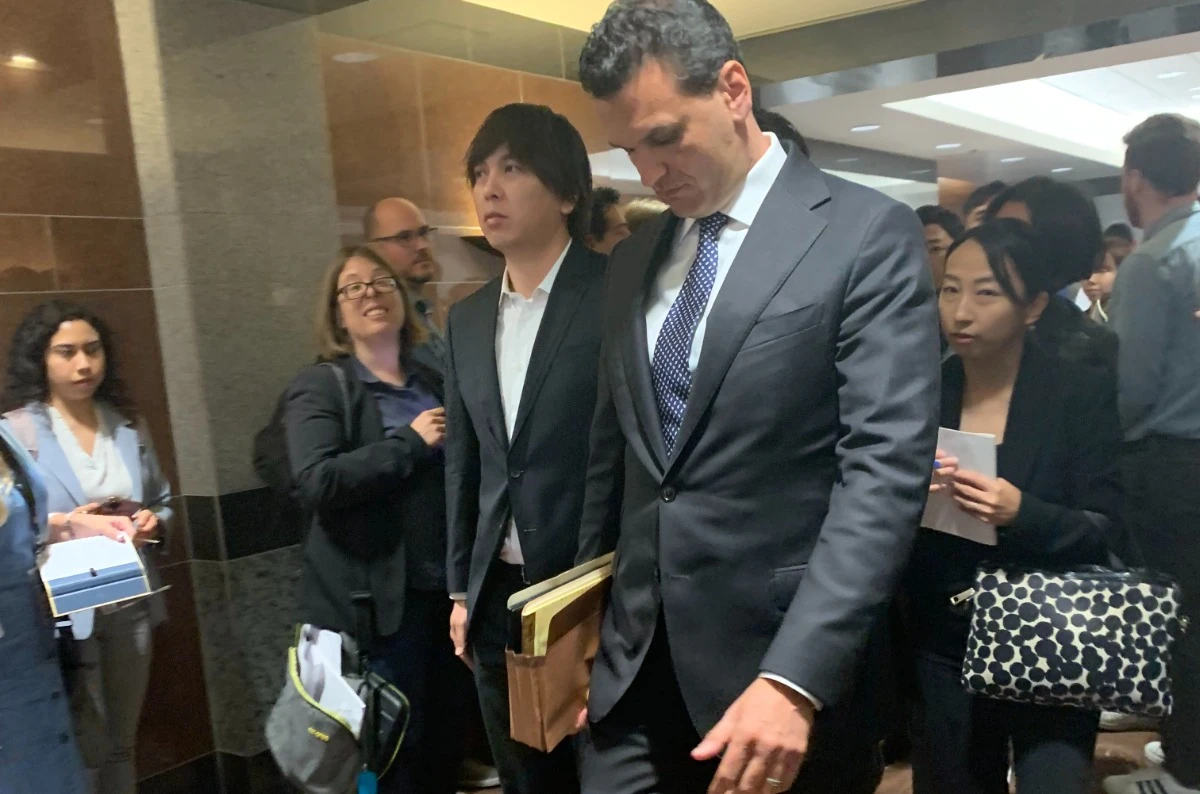Ohtani’s ex-interpreter pleads not guilty as part of deal; plans to change plea as early as next week

Mizuhara, the ex-interpreter for LA Dodgers star Shohei Ohtani, faces up to 33 years in prison and $1.25m in fines. He agreed last week to plead guilty to one count of bank fraud and one count of filing a false tax return. Mizuhara’s theft and illegal gambling were first reported on 20 March and the translator turned himself in to authorities on 12 April.
The arraignment took place at the Edward R Roybal Center and Federal Building in downtown Los Angeles.
As a testament to Ohtani’s popularity, an auxiliary courtroom was jammed with 46 reporters from media outlets, including CNN, Bloomberg and the Associated Press. Reporters signed a petition criticising the court for relegating them to a separate courtroom. Audio was available, but no video. Veteran court reporters said the move was unprecedented and the crowd unusual.
The federal government considers Ohtani to be a “victim” in the case. Major League Baseball thus far is not conducting its own investigation.
Mizuhara mum with media
Mizuhara previously admitted he was guilty in texts obtained by the federal government and made public in an affidavit. The Japanese-language interpreter and his lawyer, Michael Freedman, declined to talk to the media on Tuesday. A scrum of reporters bearing microphones and cameras surrounded Mizuhara as he entered the federal building.
Reporters shouted multiple questions, including asking Mizuhara if he had anything to say to the Dodgers. Another asked if Ohtani “really didn’t know about this”. Mizuhara stayed mute and did not make eye contact.

In court, Mizuhara spoke little, answering Judge Jean P Rosenbluth’s questions with “Yes I did” or “Yes, ma’am”.
Tuesday’s proceeding was short. Mizuhara agreed that by entering a plea agreement he waives his right to an indictment.
Case moved to Orange County, where crimes took place
Rosenbluth said the case will be transferred to Judge John W Holcomb, whose chambers are in the Ronald Reagan Federal Building in Santa Ana in Orange County.
The change of venue seems logical. Mizuhara is an Orange County resident (Newport Beach) and was allegedly betting with an illegal bookmaker based in the county. Although not named publicly, all signs point to the bookmaker being Mathew Bowyer.
The case is yet another connected to the Wayne Nix illegal gambling ring. Nix, a former minor-league baseball player, ran an illegal sportsbook business in California for more than 20 years. In 2022, he pleaded guilty to federal tax fraud charges. The investigation into Nix’s business has already ensnared several professional athletes – including former LA Dodger Yasiel Puig and former Chicago Bull Scottie Pippen.
The wide-reaching investigation has touched professional athletes, minor celebrities, small businesses and casinos in Nevada and California. Nix won’t be sentenced until 25 September, as investigators continue to uncover more details about the operation.
Last week, ex-MGM Grand and Resorts World executive Scott Sibella was sentenced in the case.
Sibella, who was charged with failing to file a suspicious activity report about Nix, got 12 months probation and a $9,500 fine. Sibella failed to file a report after Nix paid a $120,000 marker at the MGM Grand in cash. In his plea agreement, Sibella admitted that he “was aware that Nix engaged in illegal bookmaking.” However, he said he didn’t want to acknowledge the information because it would cost MGM Grand a high-value client.
Plea deal for bank fraud will include restitution
In the initial plea deal, which was released on 8 May, Mizuhara will be required to file an amended 2022 tax return. According to the plea, Mizuhara did not claim $4.1m in income and claimed $5,000 in illegal deductions. On the bank fraud charge, he will also be required to pay Ohtani back the $16.98m he stole.
Mizuhara began betting in September 2021. Within months, he “engaged in a scheme… to fraudulently obtain money” from Ohtani’s account. Mizuhara was able to change “security protocols” including the email address and phone number on Ohtani’s account. He was also able to “trick” bank employees using Ohtani’s personal information and order wire transfers.
All details of the plea agreement are not public and may not yet have been negotiated.
